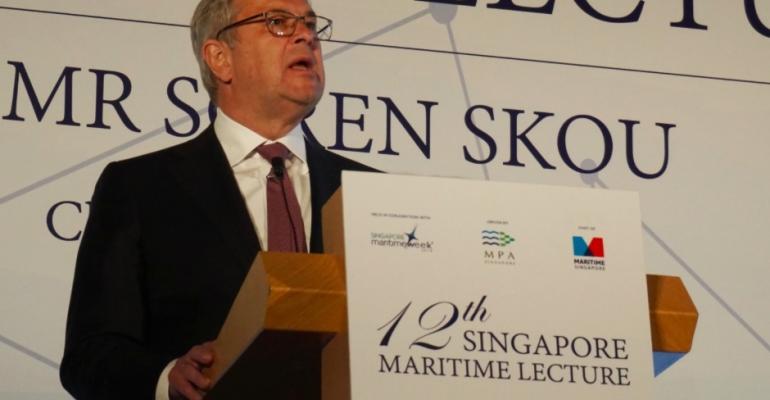With container shipping embracing digitalisation for its relationship with its customers Skou is aiming for a much more standardised transactional process rather than the current complex negotiated deals.
“My vision is for it to be equally simple and easy to book a container transport from end of the world [to another] as it is in our private lives to book an airline ticket. I don’t mean just the ocean leg, I mean end to end, online all of the needed services not just transport, customs brokerage, finance, inland transport etc,” the Maersk chief told the Singapore Maritime Lecture on Thursday.
The Singapore Maritime Lecture organised by the Maritime & Port Authority of Singapore (MPA) is one of the flagship events of Singapore Maritime Week. Read all the news from Singapore Maritime Week on our dedicated Live From Singapore Maritime Week 2018 page
This would mean major changes to the current relationship between the container line and its customers across the whole range of the transaction of booking through to delivery.
“We need to standardise and centralise and move away from global deals and what we call paper rates. That means it’s time for a seismic change in our industry – that means that every parameter in a transaction can no longer be negotiated,” he stated.
Continuing with the airline comparison he asked the audience imagine an airline operating like container lines currently do. “If you can imagine an airline where one out of four passengers never shows up before departure and you do so without cost, and the same airline can bump passengers to next week or the week after without any consequences or offering any compensation.”
In particular Skou highlighted a “culture” of no-shows of cargo by shippers, and roll overs by the shipping lines, saying that in some trades no-show rates for bookings reached 40%, and that fluctuating rates of no-shows made it impossible for lines to forecast capacity demand.
“In my view there are only losers here because carriers are left with empty space, and shippers from time to time have their cargo left behind causing delays and extra cost in their supply chain, and today it certainly influences the way we price. We are quite keen to break this cycle and we have to digital initiatives to do just that,” he said.
One of these is a new online platform on which the line guarantees the customer space, while the customer booking the cargo commits to paying a no-show fee is the cargo fails to arrive the ship on time. The second was joining the New York Shipping Exchange (NYSHEX) in January this year.
However, Skou has no illusions that his vision will translate into reality immediately. “I don’t imagine there is any silver bullet that will change this culture of no-shows and rollovers overnight.”
Copyright © 2024. All rights reserved. Seatrade, a trading name of Informa Markets (UK) Limited. Add Seatrade Maritime News to your Google News feed.



